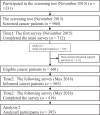Relationship between posttraumatic growth and help-seeking behavior in use of psychosocial support services among patients with cancer
- PMID: 37464204
- PMCID: PMC11502626
- DOI: 10.1007/s11764-023-01418-w
Relationship between posttraumatic growth and help-seeking behavior in use of psychosocial support services among patients with cancer
Abstract
Purpose: Cancer survivors who used psychosocial support services often report posttraumatic growth (PTG). This refers to positive psychological changes that may occur as the five domains as a result of the challenges they face. Opposing relationship also might exist. This study aimed to examine the relationship between PTG and help-seeking behavior (HSB).
Methods: In total, 710 participants completed an online survey at Time1. Of those, 395 who reported not using any psychosocial support services at Time1 were asked to participate in the Time2 survey and completed a questionnaire. The participants provided demographic information, the experiences of using psychosocial support services, and the overall and five domains of PTG.
Results: Those who experienced HSB at Time1 reported a higher PTG, and two of the PTG domains, Appreciation of Life and New Possibilities, than those who did not used services. Mixed ANOVAs showed the main effects of the HSB on the overall PTG, Appreciation of Life, and New Possibilities. Hierarchical logistic regression analyses showed that Appreciation of Life at Time1 was significantly related to the engaging in HSB at Time2.
Conclusion: Those who received psychosocial support services reported a higher PTG. Participants may have also engaged in HSB because they had experienced PTG. People who are likely to seek help and experience PTG may share common characteristics.
Implications for cancer survivors: Support for those who do not fit the existing PTG and the use of psychosocial support services should also be considered.
Keywords: Help-seeking behavior; Patients with cancer; Posttraumatic growth; Psychosocial support service.
© 2023. The Author(s).
Conflict of interest statement
The authors declare no competing interests.
The authors have no relevant financial or non-financial interests to disclose.
Similar articles
-
Finding the silver linings: Psychosocial correlates of posttraumatic growth among husbands of Chinese breast cancer survivors.Psychooncology. 2020 Oct;29(10):1646-1654. doi: 10.1002/pon.5484. Epub 2020 Aug 7. Psychooncology. 2020. PMID: 33463847
-
The role of posttraumatic stress and posttraumatic growth on online information use in breast cancer survivors.Psychooncology. 2018 Aug;27(8):1971-1978. doi: 10.1002/pon.4753. Epub 2018 May 25. Psychooncology. 2018. PMID: 29740909
-
Posttraumatic growth in head and neck cancer survivors: Is it possible and what are the correlates?Psychooncology. 2018 Jun;27(6):1517-1523. doi: 10.1002/pon.4682. Epub 2018 Apr 16. Psychooncology. 2018. PMID: 29473248
-
"Turning personal tragedy into triumph": A systematic review and meta-analysis of studies on posttraumatic growth among suicide-loss survivors.Psychol Trauma. 2021 Mar;13(3):322-332. doi: 10.1037/tra0000977. Epub 2020 Nov 19. Psychol Trauma. 2021. PMID: 33211518
-
The relationship between posttraumatic growth and health-related quality of life in adult cancer survivors: A systematic review.J Affect Disord. 2020 Nov 1;276:159-168. doi: 10.1016/j.jad.2020.07.044. Epub 2020 Jul 18. J Affect Disord. 2020. PMID: 32697695
Cited by
-
Barriers and risk factors associated with non-treatment-seeking for suicidality onset during the COVID-19 pandemic among young adults.Psychiatry Res. 2024 Oct;340:116095. doi: 10.1016/j.psychres.2024.116095. Epub 2024 Jul 23. Psychiatry Res. 2024. PMID: 39111234
-
Post-Traumatic Growth in Adult Cancer Survivors: A Scoping Review of Psychological Factors, Predictors, and Interventions.Int J Psychol. 2025 Oct;60(5):e70097. doi: 10.1002/ijop.70097. Int J Psychol. 2025. PMID: 40874359 Free PMC article. Review.
-
Influencing factors of health promotion behaviour in patients with aortic dissection: a qualitative study using the COM-B model.BMJ Open. 2025 Mar 5;15(3):e076181. doi: 10.1136/bmjopen-2023-076181. BMJ Open. 2025. PMID: 40044200 Free PMC article.
-
The relationship between psychosocial support service utilization, coping and post-traumatic growth among breast cancer survivors.J Psychosoc Oncol. 2025 Apr 9:1-18. doi: 10.1080/07347332.2025.2486229. Online ahead of print. J Psychosoc Oncol. 2025. PMID: 40203185
References
-
- Hirai K, Shiozaki M, Motooka H, Arai H, Koyama A, Inui H, et al. Discrimination between worry and anxiety among cancer patients: development of a brief cancer-related worry inventory. Psychooncol. 2008;17:1172–9. 10.1002/pon.1348. - PubMed
-
- Bellizzi KM. Expressions of generativity and posttraumatic growth in adult cancer survivors. Int J Aging Hum Dev. 2004;58:267–87. 10.2190/DC07-CPVW-4UVE-5GK0. - PubMed
-
- Casellas-Grau A, Ochoa C, Ruini C. Psychological and clinical correlates of posttraumatic growth in cancer: a systematic and critical review. Psychooncology. 2017;26:2007–18. 10.1002/pon.4426. - PubMed
MeSH terms
Grants and funding
LinkOut - more resources
Full Text Sources
Medical


